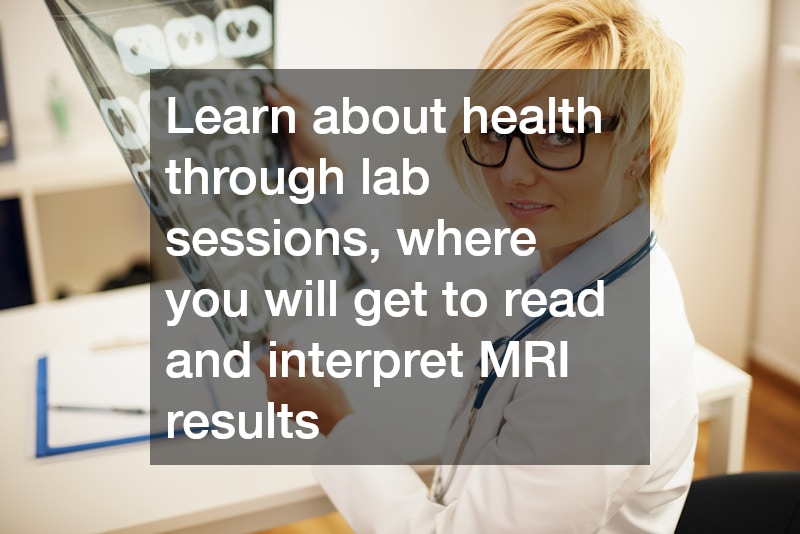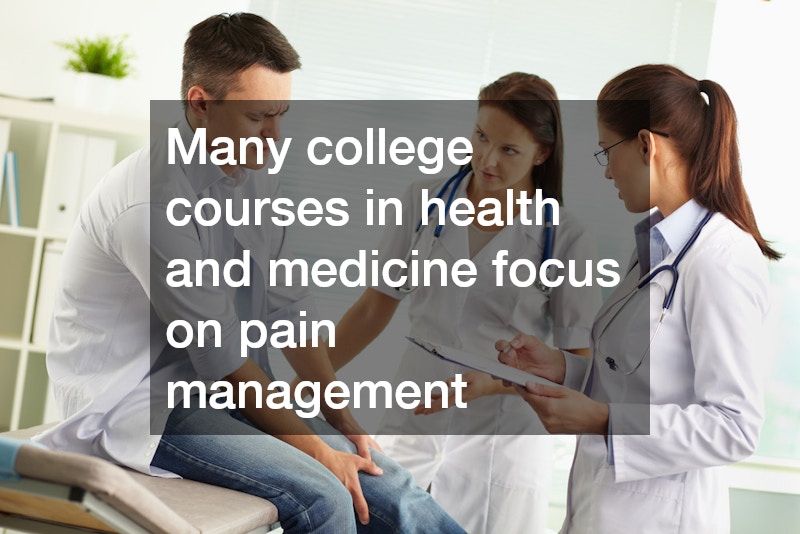The opportunities to learn more are virtually limitless when you’re in school. Your health is an area where you should pay special attention. Understanding health is not only important for maintaining your well-being, but it can also have a direct impact on your academic performance, your energy levels, and your stress management. You can make better decisions regarding your mental and physical health by developing a strong understanding of the subject.
Initially, a college course in health can be overwhelming. It can be hard to know where to begin with so much information and a busy life. Learning about health does not have to be difficult. By utilizing the appropriate resources and techniques, it is possible to seamlessly integrate health education in your college experience. These learning strategies can help you learn about important health topics, whether you are pursuing a healthcare career or just looking to improve your life.
This article will walk you through 10 ways that you can learn more about health while in college. From medical imaging to the importance of regular check-ups, we will cover a wide range of topics. You’ll also gain insights into specialized areas like pain management, urgent care, and neuro-rehabilitation. Each section contains a mix of general information and actionable, specific information to ensure that you are well-rounded in your understanding of the various aspects of health. This guide is for anyone interested in improving their health literacy, whether they are studying biology or pre-med.
1. Get Familiar with Medical Imaging

Modern diagnostic procedures are based on medical imaging. X-rays and CT scans are among the technologies that provide healthcare professionals with detailed images of internal body structures. Anyone interested in a career in health sciences should learn the basics of medical image processing in college. This information will help you understand how these machines work, what data they produce, and the applications of medical imaging.
MRI scans use radio waves and strong magnetic fields to create detailed images of organs and tissue inside the body. You can learn more about this technology in college by learning how MRIs work, the conditions that they diagnose, and their advantages and disadvantages. You can learn about health through lab sessions, where you will get to read and interpret MRI results.
2. Explore Open Imaging Options
The benefits of open imaging over traditional techniques are increasing. Patients who are anxious or claustrophobic during standard MRI procedures can benefit from these alternatives. Understanding open imaging options allows you to better appreciate the impact of medical technology on patient care. These alternatives will help you to stay on top of the healthcare industry as it evolves.
Open Upright MRI is one type of open imaging. The Open Upright MRI is different from conventional MRI scanners in that it allows the patient to be scanned either seated or standing. This technology can be used to diagnose joint or spine issues that may not be visible in a reclining posture. Explore how this new technology improves patient comfort and diagnostic accuracy. You can also conduct a comparison study of different imaging modalities as part of your coursework.
3. Understand the Logistics of Medicine Distribution
Distribution of pharmaceuticals plays a crucial role in the healthcare system. It is crucial to understand the logistics of pharma transport in order to ensure that medications are delivered efficiently and safely. These fundamentals are often covered in college courses on supply chain management and health, which emphasize the importance of a smooth distribution system for maintaining public health. You can gain a better understanding of the logistics involved in delivering drugs to patients and healthcare facilities by learning about these topics.
If we dig deeper, pharma transportation is the safe and efficient transport of pharmaceutical products, from manufacturers, to hospitals and pharmacies. Climate control, security, and regulations are all important factors in this process. Case studies of challenges and solutions to pharma transport logistics will help you gain a better understanding of the importance of this aspect of healthcare.
4. Learn About Medical Film Technology
Medical films play a vital role in many diagnostic and therapeutic processes. Flexible and durable films made of materials like TPE (Thermoplastic Elasticomer) are essential in modern healthcare. You will gain a better understanding of medical technology advances by learning about the applications of medical films in college. Students interested in materials science or medical device development will benefit from this knowledge.
TPE medical films are used for a wide range of medical applications, including surgical drapes and gowns, as well as other protective barriers. These films are biocompatible and can be used in a variety of clinical settings. Studying the advantages of TPE over other materials and its properties can help you learn about health. This is a great topic for health science research projects or presentations.
5. Study Modern Infusion Therapies
Infusion therapy has revolutionized the treatment of chronic diseases. Patients with pain and depression can find new hope through modern techniques like ketamine infusion therapies. You will gain a deeper understanding of innovative medical approaches by studying these advanced treatments in college. Students pursuing careers in medicine, pharmacology, or therapeutic services will find this knowledge particularly useful.
Ketamine infusion therapies, in particular, are gaining popularity for their effectiveness in treating chronic pain and severe depression. Ketamine is a faster-acting antidepressant than conventional antidepressants. It can provide relief in just a few hours or days. Research the clinical applications of ketamine therapy, the mechanisms involved, and ongoing studies that assess its efficacy and long-term safety. This topic can be a rich source of information for writing a thesis or research paper.
6. Master Chronic Pain Management

Millions of people suffer from chronic pain, which makes pain management an important aspect of healthcare. Effective strategies to manage chronic pain can improve the quality of life for those who suffer from it. Many college courses in health and medicine focus on pain management, from pharmacological treatment to alternative therapies. Understanding these strategies gives patients a complete overview of their options.
Pain management is a broad term that includes medications, physical therapy, and psychological support. Cognitive-behavioral therapies (CBT) such as mindfulness and cognitive-behavioral treatment also play an important role in managing chronic back pain. Explore how multidisciplinary strategies are implemented to provide holistic health care. Participating in clinical rotations or conducting case studies about successful pain management programs can provide practical insight into this important area of healthcare.
7. Discover Headache Relief Strategies
Understanding headache relief is important because headaches are a common problem that can cause daily disruptions. College health classes include learning about headaches, their causes, and how to treat them. You will be able to better manage your headaches with this knowledge. It is also valuable if you are interested in a healthcare career. Understanding the causes of headaches and finding effective remedies for them can improve your overall health.
Specific headache relief can be found in over-the-counter medications or lifestyle changes. Stress, dehydration, or poor posture are all triggers that can make headaches worse. Investigate the latest research in headache treatment and prevention to learn more about your health. You can do this by reviewing clinical studies, participating in workshops, or having peer discussions about effective headache management strategies.
8. Explore Neurological Rehabilitation
Patients recovering from neurological disorders and injuries need to undergo neurorehabilitation. The different neuro rehab options can give you a better understanding of how to improve the patient’s outcome. These rehabilitation techniques are often covered in college courses on physical therapy and occupational therapy.
Neuro rehab may include speech therapy, physical therapy, or occupational therapy. These therapies can help improve communication and restore motor functions. Study the effects of rehabilitation programs and the most recent advancements. Volunteer or do an internship at a rehab center to get hands-on training and gain a better understanding of the process.
9. Gain Insight into Emergency Medical Care
It is important to have access to emergency medical treatment in order for you to deal with any urgent health problems. Health education is important in understanding how urgent care centers operate and their role within the healthcare system. Learning about urgent care protocols and practices can help you prepare for medical emergencies in college and give you valuable insight if you want to work in healthcare administration or emergency medicine.
Urgent care centers provide immediate medical treatment for non-life-threatening situations. These facilities fill the gap between primary doctors and emergency departments. Explore the health issues that are treated in urgent care centers. You can also learn about the medical staff qualifications and operational challenges. Job shadowing or internships at urgent care facilities can provide first-hand knowledge and practical experience.
10. Prioritize Routine Health Check-Ups
Routine health checks are crucial for maintaining good health. They also allow early detection of any potential health problems. In college, it is important to learn about the importance of regular doctor’s visits. These check-ups are a great way to keep track of your health, get vaccinated, and talk with a professional about any concerns. Routine health checks promote better health and preventative care.
Regular visits to your doctor’s office can aid in the early detection and treatment of diseases like hypertension, cancer, diabetes, etc. You can learn about your health by becoming familiar with the recommended screening schedules for different diseases and the advantages of maintaining a relationship with your healthcare provider. Take part in health fairs or community health programs on campus to encourage your peers to get regular check-ups.
It is important to learn about health while in college, both for your personal development and career. By gaining a solid understanding of healthcare topics, you can make better decisions about your health and lay the foundation for a career in healthcare. You can learn about the technology used to diagnose and track various conditions by studying medical imaging basics. Open imaging options will also help you to gain a better understanding of non-invasive diagnostic methods, as well as advanced scanning techniques. Understanding the logistics of medicine delivery, including the role played by pharma transport, will help you understand the complex systems that ensure treatments are delivered safely and efficiently to patients around the world.
Studying medical films and infusion therapies such as ketamine opens up your mind to new treatments for chronic pain and depression. Understanding the latest medical technologies and strategies will enhance your appreciation of healthcare. Understanding headache relief and neurological rehabilitation will improve your ability to treat and manage common and complex medical conditions. Understanding the importance of having quick access to emergency care, such as urgent care clinics and routine health checks, completes a comprehensive healthcare education.
The college environment is ideal for immersing yourself in these important health topics. Not only will you improve your well-being, but you’ll also be able to make a meaningful contribution to the healthcare industry. The knowledge you gain in these fields will be invaluable to your career, whether it is as a nurse, doctor, pharmacist, administrator, or other medical professional. Use the resources available to you, such as classes, labs, and internships. You can become a knowledgeable and skilled professional by incorporating these topics into your educational program. This will help you to meet the challenges of the changing healthcare industry and improve the quality of care for patients.
